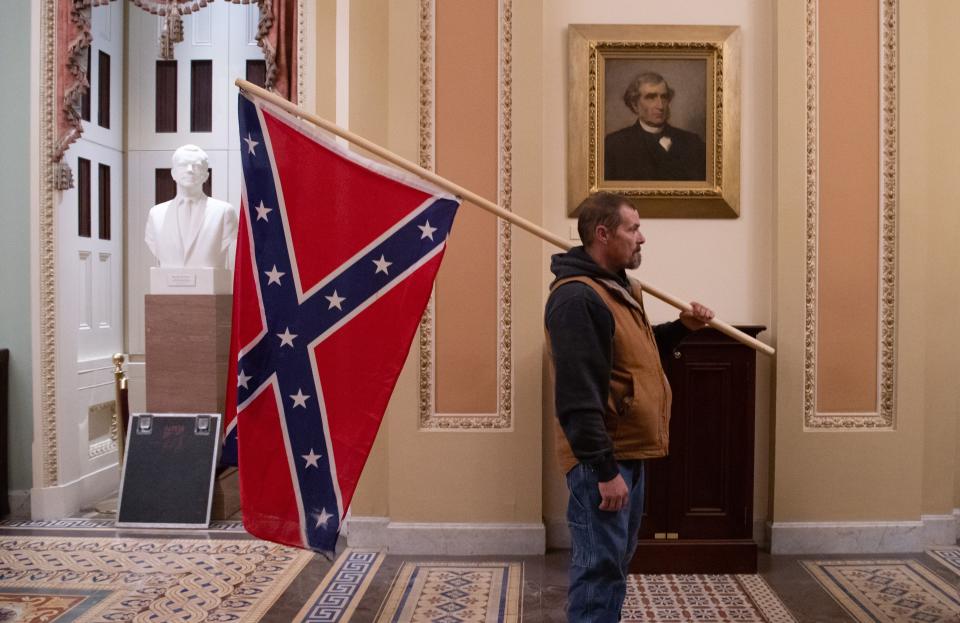Supreme Court decision may keep Confederate flag-toting Jan. 6 rioter out of prison
A U.S. Supreme Court ruling issued Friday is likely to help the Confederate flag-toting Delaware man convicted for his role in the Jan. 6 insurrection in his effort to stay out of prison.
The ruling limits how Kevin Seefried's most serious conviction, obstructing Congress' certification of President Joe Biden's election victory in the U.S. Capitol that day, may be applied to his case, as well as the cases of potentially hundreds of others convicted of crimes for that day.
Seefried, a 54-year-old drywall installer from Laurel, served one year of a three-year prison term before being granted an early release in May pending Friday's Supreme Court decision. Last year, a judge convicted him of the obstruction felony and a handful of misdemeanors for parading around the U.S. Capitol with a Confederate battle flag and threatening a responding police officer during the Jan. 6 insurrection.
While he was sentenced to three years in prison, a judge ordered him released early when the U.S. Supreme Court took up the case of another Jan. 6 rioter charged with the same crime as Seefried's most serious conviction.
Attorneys for that other defendant, former police officer James Fischer, argued that prosecutors had interpreted the obstruction charge too broadly and that it did not apply the conduct shown by those who stormed the Capitol on Jan. 6.
Prior reporting: Why Confederate flag-carrying Delaware Jan. 6 rioter was granted an early prison release
Congress adopted the law in 2002 after the Enron scandal, when the failed energy firm's accountants were found to have destroyed documents and no charges were available to use against them. Prosecutors in the Jan. 6 cases said it also applied to rioters' conduct, accusing them of seeking to obstruct Congress' actions that day.
On Friday, the Supreme Court ruled that the interpretation was too broad.
In depth: Supreme Court orders new review of obstruction charges for Trump and Jan. 6 defendants
"Prosecutors have to prove that the defendant impaired the availability or integrity for use in an official proceeding of records, documents, objects or other things used in an office proceeding, or attempted to do so,” Chief Justice John Roberts wrote for Justices Clarence Thomas, Samuel Alito, Neil Gorsuch, Brett Kavanaugh and Ketanji Brown Jackson.
The ruling remands the case back to the U.S. Appeals Court where it will be up to federal prosecutors in the U.S. Department of Justice to respond.
"For the cases affected by today’s decision, the Department will take appropriate steps to comply with the Court’s ruling," said Attorney General Merrick Garland in a written statement.
What does this mean for Kevin Seefried and other Jan. 6 participants?
While the Supreme Court decision was centered on a particular defendant, it is likely to have wide implications for hundreds of defendants charged in the Jan. 6 riot. One-fourth of the defendants – 350 of the first 1,350 people prosecuted in the riot – were charged with obstruction.
Seefried and his adult son, Hunter, stormed the Capitol together after attending the “Stop the Steal” rally, where then-President Donald Trump addressed thousands of supporters in Washington on Jan. 6, 2021. Kevin Seefried was the 12th rioter to set foot inside the building that day, according to prosecutors.
Kevin Seefried was sentenced to three years for the felony obstruction charge and one year for other misdemeanor convictions, to run concurrently with the felony charge. When the Supreme Court took up Fischer's case in December, Kevin Seefried petitioned his judge for early release.

In arguing for his early release, a federal public defender said that the possibility of the Supreme Court overturning his most serious charge means he should not be in prison waiting to see if that happens. They also argued he is not a risk to run from the law.
Federal prosecutors countered that Kevin Seefried is a danger, particularly in light of the coming election.
The judge sided with Kevin Seefried's attorneys, writing that all of his other charges tally to a year in prison, so he should serve that before being released pending the outcome of the Supreme Court's consideration of his felony charge.
He was released in May.
Given the Supreme Court ruling, it is likely Seefried will remain out of prison. The ruling limits prosecutors' use of the charge to situations where a person is accused of tampering with or destroying documents, which is not conduct that applies to Seefried's case.
It is not immediately clear how Department of Justice prosecutors will address Kevin Seefried's felony conviction now that the Supreme Court has limited its use.
Meanwhile, Seefried's son, Hunter, was also convicted of charges related to his presence in the U.S. Capitol on Jan. 6. He received a lesser sentence and was released from prison earlier this year.
Reporting from USA Today contributed to this article.
This article originally appeared on Delaware News Journal: Delaware's Confederate flag-toting Jan. 6 rioter aided by court ruling

